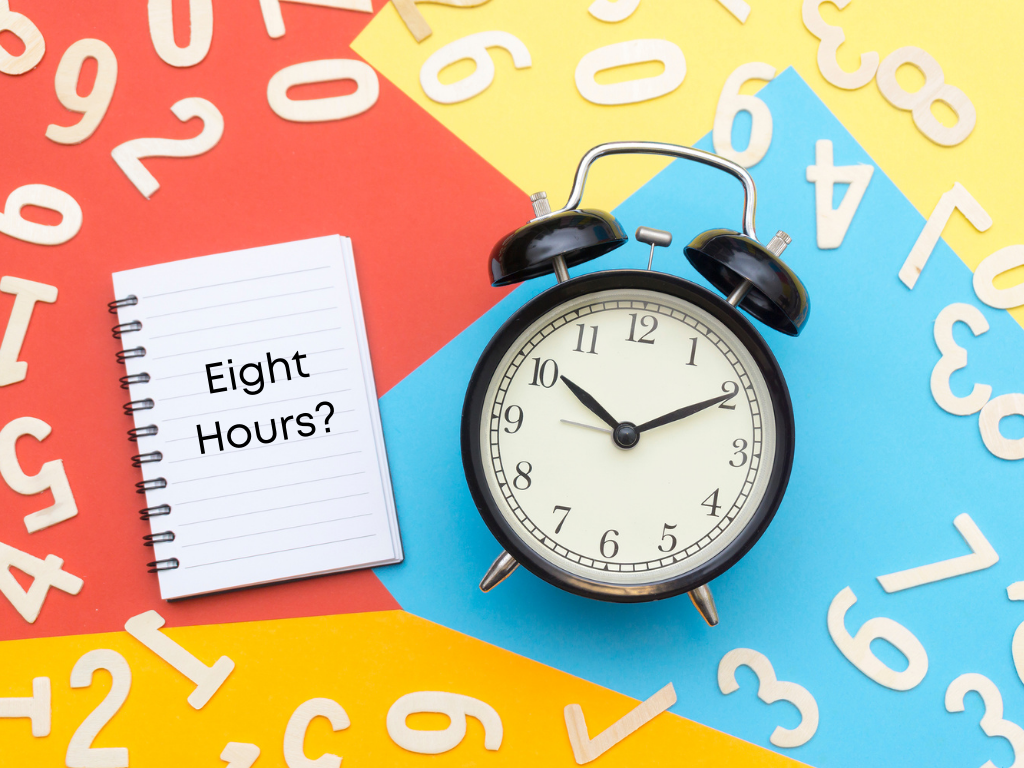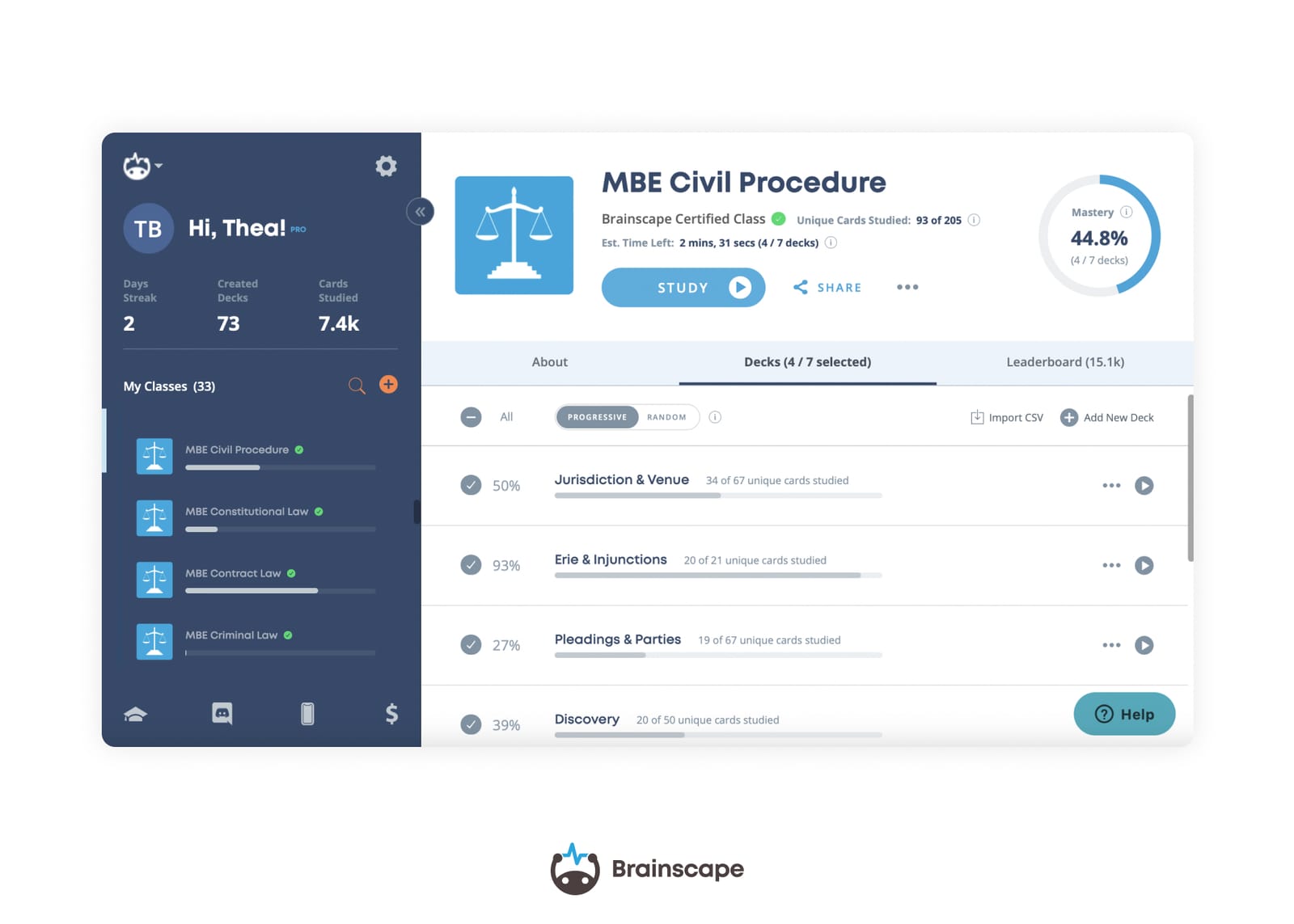The bar exam is, without a doubt, the biggest exam of your life. And, coming right out of law school, most grads are eager to register right away and get it over with, so that they can embark upon a career in law.
The question is: when should you start studying for the bar exam? Naturally, if you’re fresh out of law school, you’re going to want to take a few weeks off to congratulate yourself on surviving; maybe take a little vacation for some much-deserved R&R. But how much time should you give yourself before you start studying for the bar exam?
When Should I Start Studying For The Bar Exam?
Look, everyone’s different, but the general recommendation for students who are studying full-time is 40 to 50 hours of studying per week, starting at least nine weeks before their bar exam date.
So, for example, if you’re taking the bar exam at the end of February next year, you should start studying in late December this year. OR, if you’re taking the bar exam at the end of July next year, you should start studying before late May.
Remember, however, this is a minimum recommendation for full-time students. To be safe—you know, in case you come down with the flu or have a few unproductive days of procrastination—I’d recommend slapping an additional week or two onto this forecast.
If, on the other hand, you’re working part- or even full-time, you’re going to have to spread the same amount of total study (360 to 450 hours) over a longer period of time. And that’ll be up to you to work out. Either way, it’s totally doable, and you’ve got what it takes!
How Many Hours A Day Should I Study For The Bar Exam?

If you start studying 9 weeks before the bar exam and treat it like a full-time job, you’re looking at 8-hour days, Monday to Friday, for a total of 40 hours per week. But you can chop it up however you want. In fact, here are some examples of study schedules (all assuming you’re working to a total of 40 hours per week, for 9 weeks in total):
- 8-Hour study days, Monday to Friday, Saturday, and Sunday off
- 6.5-Hour study days, Monday to Saturday, Sunday off.
- 6-Hour study days, Monday to Friday; 5-hour study sessions on Saturday and Sunday
- 7-Hour study days, Monday to Friday, 2 to 3-hour study sessions on Saturday and Sunday.
Of course, you can play around with your time distributions if you start studying for the bar exam earlier … say, a week or two before. It all depends on YOU. Whichever way you swing it, there are three important things to remember:
- It’s better to spread your studying out than to cram;
- Study breaks are essential for managing stress and staying motivated; and
- There is a study tool that can help you efficiently nail the necessary (and total pain-in-the-butt) content memorization aspect of the bar exam, and I’m gonna tell you a little bit about that right after this pro tip ...
Pro Tip: Long study sessions burning you out? Mix up your study modes and media so that you stay engaged. For example, spend an hour reviewing older content; 2 to 3 hours learning new content through textbooks, lecture videos, taking notes, etc, and 2 to 3 hours practicing questions.
How Can You Accelerate Your Learning With Flashcards?
Okay, so about that study tool. It’s flashcards!
Digital flashcard apps like Anki or Brainscape are proven to improve exam marks and student satisfaction among law students. They achieve this by automating a technique called spaced repetition. That means that they show you the same concept repeatedly, just before you're about to forget it. By only showing you cards timed perfectly to land within your optimal learning zone, they massively improve learning efficiency and lock information into your long-term memory.

In the old days, you had to write paper flashcards and organize the process of spaced repetition by yourself (YAWN). However, digital flashcard apps like Quizlet and Brainscape automate this process and even personalize repetition rates based on your individual memory progress. One study found that law students using spaced repetition were over 19% more likely to pass the bar exam!

The list of benefits goes on! By tracking your study and letting you know when you've progressed, they increase your motivation, and by taking out the tedious work of deciding what concepts to study next, they leave you with more mental energy for learning, which results in faster learning.
So, if you’re curious, check out digital flashcard apps like NeuroNation or Brainscape, and start studying TWICE as efficiently as you could have using more traditional study techniques.
Okay, now back to when you should start studying for the bar exam ...
What If I’m A Repeat Test Taker?
The advice I’ve provided up until this point has been for first-time test takers. But if this is the second or third (or more) time you’re taking the bar exam, there are certain things you just don’t need to do all over again, like watching all of the lectures, for example. So, in theory, it shouldn’t take you as long.
But, having said that, you’ve certainly still got your work cut out for you! Right now, your job is to figure out where you went wrong, where your weaknesses lie, and how to attack them in a systematic manner until you are a merciless bar exam assassin.
In terms of when you should start studying for the bar exam (round two), it’s a little harder to say because you may have failed by a hair’s breadth ... or you might have flunked it completely. How far off the mark you were will determine how much work is needed to get you ready for your next attempt.
Either way, take a week or two (in addition to your new study schedule) to get over the disappointment. And if you work hard, study efficiently, and polish up those critical thinking skills, you should definitely be able to register for the next bar exam administration.
Before I Leave You, A Cautionary Tale ...
So, we’ve answered the question: “When should I start studying for the bar?” and even given you a little inspiration on the variety of study schedules you might follow, depending on how you like to portion out your workload.
But this discourse on studying for the bar exam wouldn’t be complete if I left you without a stern word of warning. You see, some students like to put off their bar exam prep until a few weeks before the exam, stating that they just “work better under pressure”.
The thing is, you cannot even begin to understand the nature of bar exam stress until you’ve felt its sickly grip around your throat. Also, there is a MOUNTAIN of work to get through, and not just content memorization, either. Learning how to answer bar exam questions, which are notoriously tricky, is a skill that requires dogged practice.
So my final tidbit of advice to you is to start studying for the bar exam early, at least nine weeks before. DO NOT CRAM. Instead, make a steady study plan that incorporates a variety of study resources, like practice exams and digital flashcards. Remember: if you portion out your work into daily, achievable study goals, you will arrive at the bar exam ready and prepared to crush it!
Additional Reading
- 5 Tips For Staying Sane During Bar Prep
- How to Study for the Bar Exam More Efficiently
- How and When to Take Study Breaks for Optimal Learning
References
Bingol, M. (2025). The Impact of Using Virtual Vocabulary Learning Applications on Enhancing Law Students’ Lexical Competence at the Tertiary Level. https://doi.org/10.31235/osf.io/eg34x
Colbran, S., Gilding, A., & Colbran, S. (2014). The role of digital flashcards in legal education: theory and potential. European Journal of Law and Technology, 5(1).
Job, V., Dweck, C. S., & Walton, G. M. (2010). Ego depletion—Is it all in your head? Implicit theories about willpower affect self-regulation. Psychological Science, 21(11), 1686-1693.
Kang, S. H. (2016). Spaced repetition promotes efficient and effective learning. Policy Insights from the Behavioral and Brain Sciences, 3(1), 12–19. https://doi.org/10.1177/2372732215624708
Karpicke, J. D. (2012). Retrieval-based learning: Active retrieval promotes meaningful learning. Current Directions in Psychological Science, 21(3), 157-163.
McLeod, S. (2024) Vygotsky’s zone of proximal development, Simply Psychology - Vygotsky’s Zone Of Proximal Development. Available at: https://www.simplypsychology.org/zone-of-proximal-development.html
Teninbaum, G. H. (2017). Spaced repetition: A method for learning more law in less time. Journal of High Technology Law, 17, 273.
Zald, David H., Isabelle Boileau, Wael El-Dearedy, Roger Gunn, Francis McGlone, Gabriel S. Dichter, and Alain Dagher. "Dopamine Transmission in the Human Striatum during Monetary Reward Tasks." The Journal of Neuroscience 24, no. 17 (April 28, 2004): 4105.
